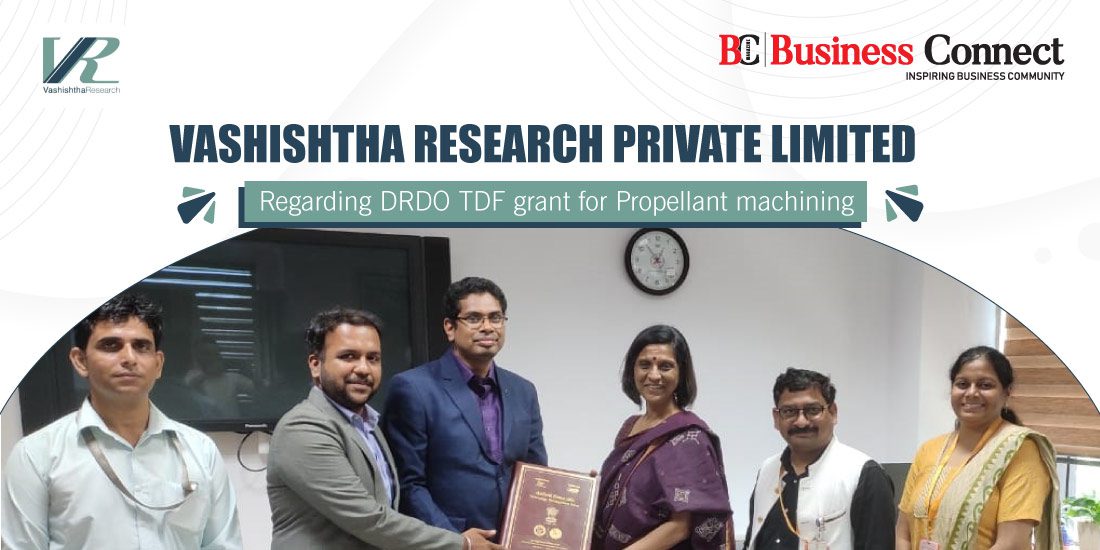Vashishtha Research Private Limited
Regarding DRDO TDF grant for Propellant machining
Title: Trivandrum-based startup secures DRDO TDF grant, aims to enable safer and more versatile solid rocket propulsion.
Trivandrum, June 10 th, 2022:
Vashishtha Research Private Limited, a startup located in Trivandrum and specializing in the fields of Robotics, Inspection and Manufacturing sector has recently secured a grant from the central government’s Defence Research and Development Organization (DRDO) for development of a solid propellant machining robot.
This project is sanctioned by the Technology Development Fund (TDF) wing of DRDO which authorizes grants of up to Rs.10 cr to start-ups and MSMEs in order to advance Military and Defence production technologies in the country. Earlier, the startup had been a winner in the DRDO Dare to Dream competition, which is organized every year to promote innovative ideas and products from individuals and start-ups.
Solid Propulsion Rockets form the backbone of any country’s tactical and strategic missile defence. It is also used in space launch vehicles as first stage and booster rockets. The geometry of the solid propellant inside the rocket (also called propellant grain configuration ) determines the thrust profile or the thrust produced by the rocket over time. Various thrust profiles such as progressive, regressive and neutral burning profiles are required to achieve the necessary trajectory of the rocket vehicle.
Figure: Different profiles of solid rocket grain
Conventionally, these propellant grain profiles are produced through casting techniques, however it is difficult to get certain types of geometry such as transverse slots and conical slots using only casting technology. Propellant machining is an enabling technology which enables the manufacturing of such kinds of grain geometry by removing the material according to the desired profile.
This is a versatile method as the desired grain geometry can be changed simply by making some changes in the software that controls the propellant machining robotics. By using transverse slots, the grain surface area and thus initial burn rate can be increased, thus allowing for the use of slower-burning propellants to achieve the same thrust. Slower burning propellant compositions are more preferable as they are easier and safer to handle.
Speaking to Business Connect India, Mr. Saurabh Chatterjee (Founder and CEO) commented:
“The machining of solid rocket propellant in a small rocket motor involves significant technological challenges. Firstly the accessibility inside the rocket motor bore is very poor and there is very little space to manoeuvre inside there. So a conventional horizontal boring machine or 6 axis robot will not work. A new type of robot needs to be designed, which can fit inside the rocket motor bore and have some sophisticated mechanisms which are miniaturized to fit into the small space yet strong enough to take machining loads.
Secondly the nature of the propellant itself which is a hazardous material. We need to have a suction system to remove the propellant chips, use slow speed and anti sparking tools to avoid igniting the propellant and grounding to prevent electrostatic discharge. Finally the entire robot must be monitored and operated remotely so that there is no danger to the operator in the case of a mishap.
Currently we will be testing the propellant machining on dummy propellants (inert material with similar mechanical characteristics) only at our place and the testing on the real propellants would be done at DRDO centres after taking the appropriate safety precautions. It’s quite challenging and we feel honoured that DRDO has entrusted a significant technology development project like this to us.”
This announcement is part of a greater industry trend within the aerospace and defence sector to move away from Russian and other imported equipment and promoting indigenization in pursuit of Atma-nirbharta (self-reliance). The recent orders given by the Indian armed forces for production of a large number of Pinaka and Astra missiles signals the continuing increase in missile production within the country. Missiles are produced by DRDO centres as well as some public and private companies like BDL (Bharat Dynamics Limited ).
Vashishtha Research Private Limited is a Robotics-based startup company located at the Indian Institute of Space Science and Technology (IIST) with a special focus on inspection and manufacturing technologies relevant to Aerospace and Defence. Their products include Thermographic inspection for Aerospace structures and Filament winding machinery and software.
Must Read:-
- Top 10 Young Entrepreneurs in India 2022
- Upcoming Indian Web Series for 2022-23
- Top 10 Hospitals in India 2022
- Top 10 richest player of the world 2021
- Top 10 highest-paid Indian Athletes 2021
- Top 10 highest paid CEO in the World
- Top 10 richest person of India
- Top 10 Highest Paid CEOs of India
- List Of Most Followed Facebook Pages in 2022
- The Success Story of Jeff Bezos
- Success Story Of Elon Musk
- Top 10 Business Magazine In India
- Top 10 Business Newspaper In India
- Top 10 richest billionaires in the world 2021
- Upcoming English Web Series in 2021
- Top 10 Tourist Places in India, places to visit after lockdown


